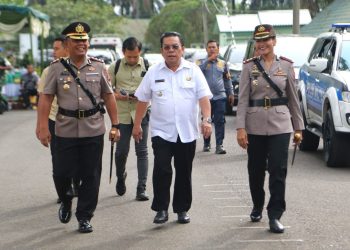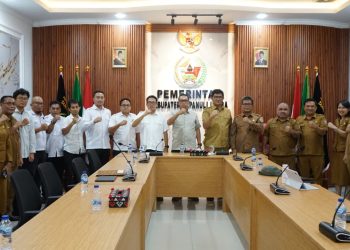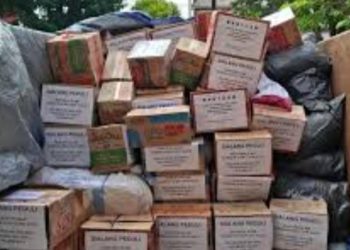SAMOSIR — SEGARIS.CO — The Medan Food and Drug Monitoring Agency (BBPOM) held a cross-sector meeting in the Lobby Room of the Samosir Regent’s Office, Wednesday (11/20/2024), as part of the final stage of the 2024 Food Safety Intervention Program.
This program includes the activities of Safe School Children’s Snacks, Safe Food Villages, and Safe Markets from Hazardous Materials.
Results and Food Safety Plans for 2025 The meeting discussed three main agendas: the results of monitoring and evaluating the food safety program in Samosir Regency, the preparation of the village food safety program for 2025, and the submission of certificates to villages, markets, and schools that are the targets of the intervention in 2025.
Assistant III of the Samosir Regency Government, Arnod Sitorus, expressed his appreciation to BBPOM Medan for its contribution in improving food safety in the region.
He hopes that the synergy between BBPOM Medan and regional apparatus will continue to ensure sustainable food safety supervision, especially for school snacks.
“We hope that this program will not only focus on socialization and monitoring, but can also be implemented in the field,” said Arnod.
Achievements and objectives of the food safety program
Head of the BBPOM Medan Infocom Team, Yanti Agustini Harahap, explained that the Safe Food Village Program aims to encourage community independence in realizing food security, increase active community participation, and strengthen the competitiveness of local food products.
In 2024, Hariara Pohan Village, Harian District, was designated as a Safe Food Village.
Meanwhile, Pangururan Traditional Market is the target of the Community-Based Safe Food Market program intervention.
Several schools in Samosir Regency, such as SMP Budi Mulia Pangururan and SMK Negeri 1 Simanindo, also received the Safe School Children’s Snacks (PJAS) intervention program.
Efforts to increase food safety awareness
BBPOM Medan has trained village food safety cadres and market management officers to monitor food safety through sampling and testing of hazardous materials with rapid test kits.
In addition, counseling to the community continues to be carried out to increase awareness of the dangers of hazardous materials in food.
“Through the cadres we train, we also provide education to the community about the importance of food safety,” said Yanti.
Challenges and Solutions for PJAS
According to Yanti, the biggest challenge in PJAS is microbial contamination due to unsuitable raw materials and unhygienic processing.
The use of food additives such as artificial sweeteners and excessive preservatives is also a risk factor.
“Unsafe PJAS can have a negative impact on the health of school children if consumed continuously. One solution that can be done is to open a safe canteen in schools to ensure that the entire food processing process is controlled,” she said.
This meeting is an important step to ensure the sustainability of the food safety program in Samosir Regency, with the hope that all related parties can work together to achieve safe and quality food. [Hatoguan Sitanggang/***]









